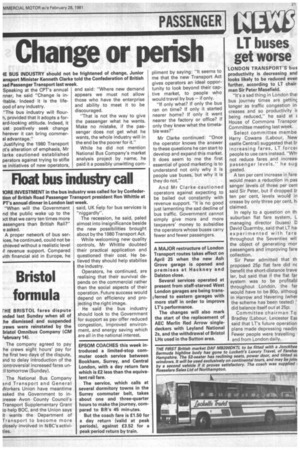IT buses get worse
Page 23

If you've noticed an error in this article please click here to report it so we can fix it.
LONDON TRANSPORT'S bus productivity is decreasing and looks likely to be reduced even further, according to LT chairman Sir Peter Masefield.
"It's a sad thing in London thal bus journey times are gettinc longer as traffic congestion in creases and so productivity jE being reduced," he said at House of Commons Transpor Committee meeting last week.
Select committee membe Harry Cowans (Labour, New castle Central) suggested that b■ increasing fares, LT force( people to use cars instead. "Wh■ not reduce fares and increass passenger levels," he sug gested.
A ten per cent increase in fare would mean a reduction in pas senger levels of three per cent said Sir Peter, but if dropped ly ten per cent, levels would in crease by only three per cent, h, claimed.
In reply to a question on th suburban flat fare system, L managing director (buses) D David Quarmby, said that LT ha, experimented with fare throughout the Seventies wit the object of generating mor passengers and improving fare collection.
Sir Peter admitted that th proposed 25p flat fare did tic benefit the short-distance trave ler, but said that if the flat far system was to be profitabl throughout London, the far would have to be 80p, althoug in Harrow and Havering (wher the scheme has been tested) ' did balance itself out at 25p: Corn mittee chairman To Bradley (Labour, Leicester Ea5 said that LT's future operation plans made depressing readin Fewer people were travelling and from London daily.




























































































